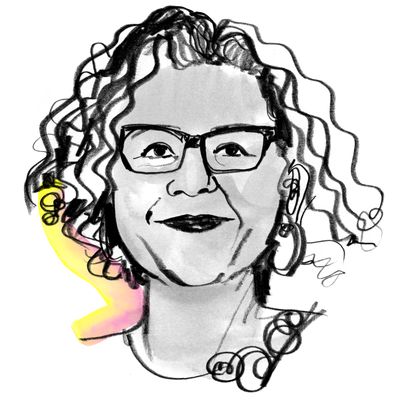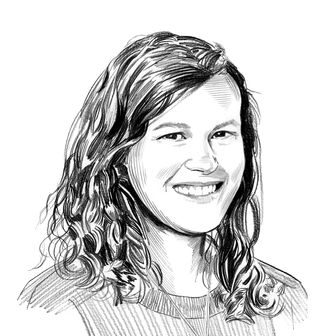
Elizabeth Alexander is a poet, memoirist, and scholar. Since 2018, she’s been the president of the Andrew W. Mellon Foundation, the largest funder of the arts and humanities in the U.S. Previously, she taught at Yale University for 15 years, where she chaired the African American Studies Department. Her 2015 memoir, The Light of the World, about the sudden death of her husband, was a finalist for the Pulitzer Prize, and in 2009, she read her poem “Praise Song for the Day” at the inauguration of President Barack Obama. She lives in Manhattan. Here’s how she gets it done.
On a typical morning:
My day starts very early with some meditation in bed. I wake up with a lot of things on my mind, and the time in between full wakefulness and sleep is a good time to let all that settle a bit, rather than starting the day like you’re being hurled into the world from a cannon. During the pandemic, stretching has also been extra important. I’ve been surprised how much more tension has been in my body. When you don’t do the usual moving around, your body just holds onto things.
The next thing is the most perfect cappuccino, which is made in a beautiful cobalt-blue cup, and then I’ll look at the newspaper and start to bring myself together. Though some mornings I have early phone calls or Zoom meetings, I prefer not to. In the early days of the pandemic, when the fear and isolation were so intense, I would see the face of a co-worker and feel awash with happiness and gratitude for the sense of connection. But as the months have gone on, Zoom can be exhausting. It’s not a toy.
On being in New York during the pandemic:
New York is the city of my heart. And it’s been so sad to be in such a great city, with so much density of treasure and human energy, with so much of it shut down and in danger and fearful. In the height of the pandemic, at the end of my day of Zooms, I would catapult out of my seat, where I’d been sitting for 500 hours, and go walk and walk for miles. That was for the spirit, for the body, but it was also to see what was happening — signs of life. Usually I’d be out walking during the 7 o’clock salute to health-care workers, and to experience that at street level — to look up and see all the people out their windows, and the cars that were honking, and people banging cans — that was really special.
On her writing routine:
In my early adult life, when I was in graduate school and starting out as a professor, I was able to make more of a beautiful fetish of my writing routines. I think I also understood early on that on one hand, you have to make writing a devotional practice, or else it won’t get conjured. It’s spirit work, and it’s craft, and there’s no substitute for time. But I also think that women are the masters of finding and using bits of time — rather than thinking, like, I need to be at a writer’s retreat, or, Everyone in the house must fall silent until it’s time for my cocktail, because that’s not what life is like. I would think of Lucille Clifton making poems at the kitchen table with six kids around her.
Over the years that I’ve been working in philanthropy, with a different kind of daily schedule, I’ve been writing in much smaller snippets. But in the midst of the pandemic, the world exploded around the issue of race. From Ahmaud Arbery to Breonna Taylor to George Floyd, there just cracked open anew this unresolved, corrosive, terrifying issue of relentless anti-Black hatred, violence, and murder. Writing about that, and teaching African American history and culture, which I think is part of the antidote to racism, has been my life’s work. I wrote a long essay called “The Trayvon Generation” for The New Yorker, which was an important watershed for me, because I realized that making time for serious writing — no matter what my other tasks are — is actually part of my responsibility. It’s part of what I can offer, how I can be helpful.
On public speaking:
I always get anxious. I think that it is respectful to your audience to take the moment seriously. To me, the anxiety is just saying, A game, girl, bring it. My public speaking used to be mostly poems, and with that, the biggest preparation is hopefully, like, write some good poems. So that’s what I would tell myself when I was nervous — Okay, well, you already did the hardest part.
On cultivating joy at home:
We have so much joy. I’m a big cooker and feeder. During these COVID months, I was eating dinner by myself every night. My two sons are students at Yale, and they were living in off-campus apartments in New Haven. But even though I was alone, dinner was always very carefully prepared, very beautifully set, and eaten with appreciation. I cook lots of yummy vegetables and salmon, like, every other day, but deliciously marinated. And then when the kids come home we go into a whole other land of lasagnas and chicken shawarmas and all kinds of things.
The happiest thing in my family over the years is when it’s us plus others at the table. There’s great joy in talking about the troubles of the day, and hearing stories from elders. We play music; we dance a lot. I dance every day, just around the house. My sons are grown — they’re young men now — but they delight me, and I tell them so.
On decompressing:
I wind down for the day almost always with a bath, a candle, and music. It takes a lot of effort in general for me to wind down because I stay wound up, especially with the racing anxieties and uncertainties of the last months. As a form of prayer, I think about all of the things that are blessings, and the people that I’m grateful for. These past few months, I’ve been grateful for the technology that has allowed me to stay in touch with the village of friends who were in other places, some of whom got sick, and with my kids, and my parents. I’m grateful for the knowledge that even when we’re not in the same place, we still belong to each other. I’m grateful for work that is helpful, and, knock wood, I’ve been very, very grateful for my good health.





